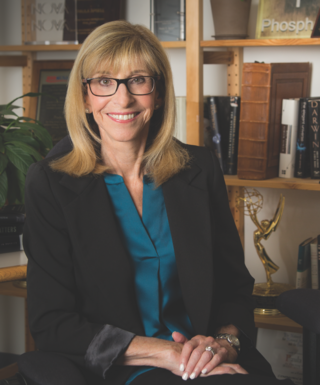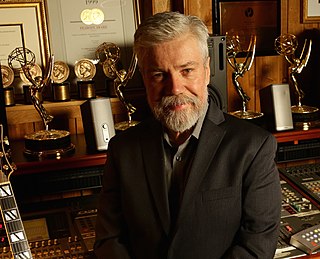
Arthur is an animated television series for children ages 4 to 8, developed by Kathy Waugh for PBS and produced by WGBH. The show is set in the fictional U.S. city of Elwood City and revolves around the lives of Arthur Read, an anthropomorphic aardvark, his friends and family, and their daily interactions with each other. The television series is based on the Arthur book series written and illustrated by Marc Brown. Production on the series was first announced in 1995 by WGBH Boston and Montreal-based animation studio CINAR, and aired its first episode on October 7, 1996. During its 25-season run, the show broadcast 253 half-hour episodes.

Masterpiece is a drama anthology television series produced by WGBH Boston. It premiered on PBS on January 10, 1971. The series has presented numerous acclaimed British productions. Many of these are produced by the BBC, but the lineup has also included programs shown on the UK commercial channels ITV and Channel 4.

Frontline is an investigative documentary program distributed by the Public Broadcasting Service (PBS) in the United States. Episodes are produced at WGBH in Boston, Massachusetts. The series has covered a variety of domestic and international issues, including terrorism, elections, environmental disasters, and other sociopolitical issues. Since its debut in 1983, Frontline has aired in the U.S. for 42 seasons, and has won critical acclaim and awards in broadcast journalism. In 2024, Frontline won its first Oscar at the 96th Academy Awards for Best Documentary Feature, 20 Days in Mariupol, made by a team of AP Ukrainian journalists. Frontline has produced over 800 documentaries from both in-house and independent filmmakers, 200 of which are available online.
Nova is an American popular science television program produced by WGBH in Boston, Massachusetts, since 1974. It is broadcast on PBS in the United States, and in more than 100 other countries. The program has won many major television awards.
Robert Franklin Palmer Jr. was an American writer, musicologist, clarinetist, saxophonist, and blues producer. He is best known for his non-fictional writing on the field of music; his work as a music journalist for The New York Times and Rolling Stone magazine; his production work for blues recordings ; and his clarinet playing as a member of the 1960s jazz band the Insect Trust.
Eyes on the Prize: America's Civil Rights Movement is an American television series and 14-part documentary about the 20th-century civil rights movement in the United States. The documentary originally aired on the PBS network, and it also aired in the United Kingdom on BBC2. Created and executive produced by Henry Hampton at his film production company Blackside, and narrated by Julian Bond, the series uses archival footage, stills, and interviews by participants and opponents of the movement. The title of the series is derived from the title of the folk song "Keep Your Eyes on the Prize", which is used as the opening theme music in each episode.
People's Century is a television documentary series examining the 20th century. It was a joint production of the BBC in the United Kingdom and PBS member station WGBH Boston in the United States. The series was first shown on BBC in the 1995, 1996 and 1997 television seasons before being broadcast in the US and elsewhere in the world in 1998.

Paula S. Apsell is the television Executive Producer Emerita of PBS's NOVA and was director of the WGBH Science Unit.

The Ring of Fire: An Indonesian Odyssey is a series of five documentary films following the decade-long Wanderjahr of the filmmaker/sibling partnership Lorne and Lawrence Blair.

Martin Smith is an American producer, writer, director and correspondent. Smith has produced dozens of nationally broadcast documentaries for CBS News, ABC News and PBS Frontline. His films range in topic from war in the Middle East to the 2008 financial crisis. He is a member of the Overseas Press Club and the Council on Foreign Relations.
Andrew Solt is a British-born American producer, director, and writer of documentary films. Solt has had a long career in television. A frequent focus of his documentaries is rock and roll music, its history and star performers.

Brian Keane is an American composer, music producer, and guitarist. Keane has been described as "a musician's musician, a composer's composer, and one of the most talented producers of a generation" by Billboard magazine.

Michael J McEvoy is an American screen composer, orchestrator and multi-instrumentalist.
Bob Sarles is an American documentary filmmaker, film editor and radio host based in San Francisco.
Jeanne Jordan is an American independent director, producer and editor. She was nominated for an Academy Award and has received the Grand Jury Prize at the Sundance Film Festival among many other awards.
Mick Gold is a British documentary film maker, photographer and journalist, who has written for publications such as Creem, Melody Maker, and Let It Rock.

David E. Fanning is a South African American journalist and filmmaker. He was the executive producer of the investigative documentary series Frontline since its first season in 1983 to his retirement in 2015. He has won eight Emmy Awards and in 2013 received a Lifetime Achievement Emmy in honor of his work.
The History of Rock 'n' Roll is a ten episode television documentary mini-series produced by Time-Life. It originally aired on the Prime Time Entertainment Network from March to May in 1995. All parts were later released on VHS, DVD, and reran on TLC and VH1, the latter which showed all ten parts in the last 10 weeks of the year 1999 on Friday night as part of a countdown to the year 2000. The series covers Rock Music from the 1950s to the 1990s and features over 200 exclusive interviews with many well-known artists and other music industry figures.
Vietnam: A Television History (1983) is a 13-part documentary mini-series about the Vietnam War (1955–1975) from the perspective of the United States. It was produced for public television by WGBH-TV in Boston, Central Independent Television of the UK and Antenne-2 of France. It was originally broadcast on PBS between October 4 and December 20, 1983.
Elizabeth Deane is a writer, producer and director of documentary films for PBS, specializing in American history. She is based primarily at WGBH-TV in Boston, with work ranging from presidential politics to biographies and musical history.








